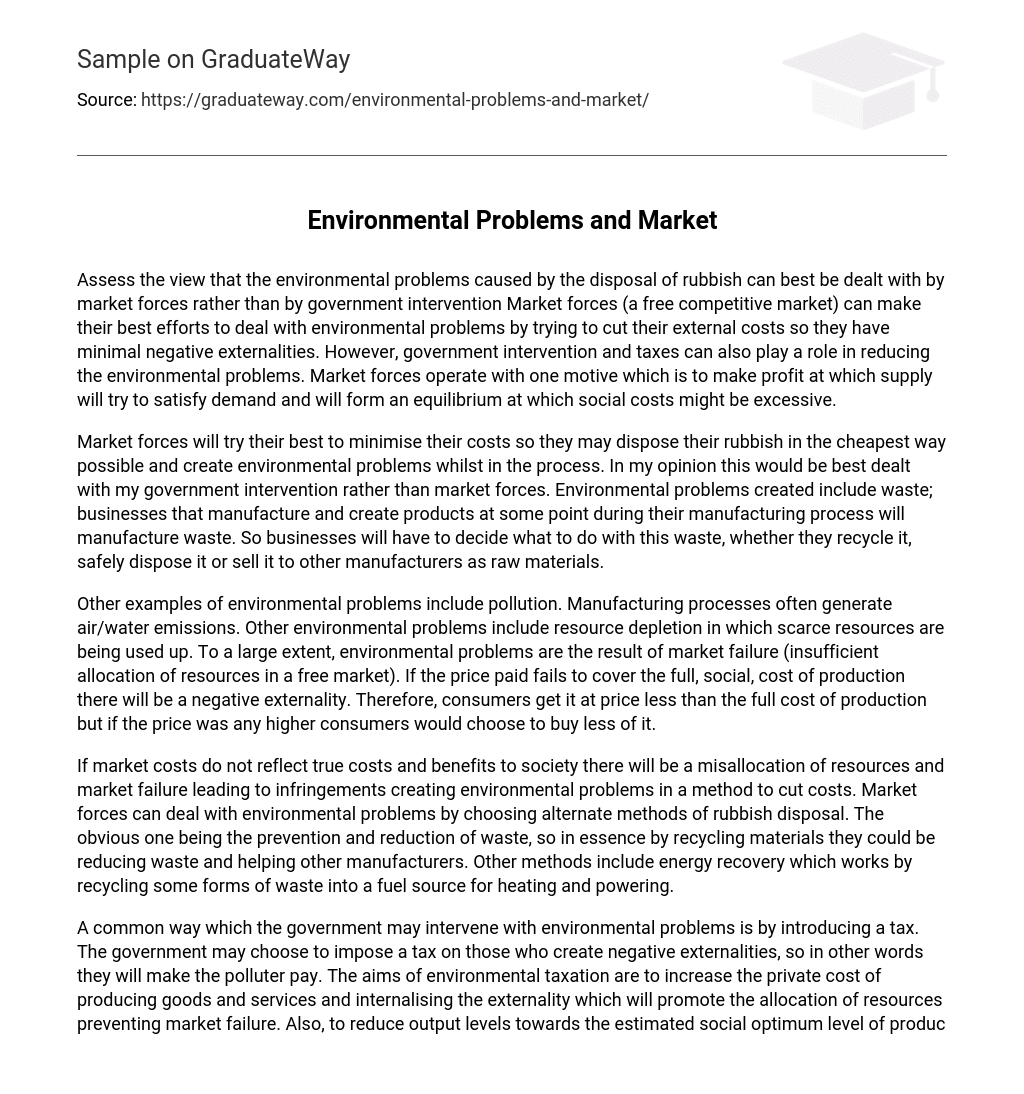Assess the view that the environmental problems caused by the disposal of rubbish can best be dealt with by market forces rather than by government intervention Market forces (a free competitive market) can make their best efforts to deal with environmental problems by trying to cut their external costs so they have minimal negative externalities. However, government intervention and taxes can also play a role in reducing the environmental problems. Market forces operate with one motive which is to make profit at which supply will try to satisfy demand and will form an equilibrium at which social costs might be excessive.
Market forces will try their best to minimise their costs so they may dispose their rubbish in the cheapest way possible and create environmental problems whilst in the process. In my opinion this would be best dealt with my government intervention rather than market forces. Environmental problems created include waste; businesses that manufacture and create products at some point during their manufacturing process will manufacture waste. So businesses will have to decide what to do with this waste, whether they recycle it, safely dispose it or sell it to other manufacturers as raw materials.
Other examples of environmental problems include pollution. Manufacturing processes often generate air/water emissions. Other environmental problems include resource depletion in which scarce resources are being used up. To a large extent, environmental problems are the result of market failure (insufficient allocation of resources in a free market). If the price paid fails to cover the full, social, cost of production there will be a negative externality. Therefore, consumers get it at price less than the full cost of production but if the price was any higher consumers would choose to buy less of it.
If market costs do not reflect true costs and benefits to society there will be a misallocation of resources and market failure leading to infringements creating environmental problems in a method to cut costs. Market forces can deal with environmental problems by choosing alternate methods of rubbish disposal. The obvious one being the prevention and reduction of waste, so in essence by recycling materials they could be reducing waste and helping other manufacturers. Other methods include energy recovery which works by recycling some forms of waste into a fuel source for heating and powering.
A common way which the government may intervene with environmental problems is by introducing a tax. The government may choose to impose a tax on those who create negative externalities, so in other words they will make the polluter pay. The aims of environmental taxation are to increase the private cost of producing goods and services and internalising the externality which will promote the allocation of resources preventing market failure. Also, to reduce output levels towards the estimated social optimum level of production – this contributes to a more sustainable economy in the long term.
There is normally a direct link between output levels and the level of pollution created. Instead of trying to change market prices and therefore affect the behaviour of consumers and producers, the government may choose to intervene directly in a market through the use of regulations and laws. For example, the Health and Safety at Work Act covers all public and private sector businesses. Local Councils can take action against noise and emissions. In conclusion, I think that government intervention works better to deal with environmental problems.
But it also has its problems as well as its benefits. For example, by imposing environmental tax this will affect consumer welfare as taxes reduce output and raise prices, so producers may pass on tax to consumers which will only have a slight effect in reducing final output. Also, by imposing laws and regulations producers may choose to move to different countries with less strict regulations and cheaper taxes leading to structural unemployment and loss off international competitiveness.
Also, imposing taxes may lead to more market forces trying to illegally avoid tax payments having an adverse affect and perhaps even lead to government failure. However, market forces can also play a part in dealing with the environmental issues by addressing the problem of waste in different ways such as recycling before it becomes a problem. Market forces have little motivation to deal with the environmental problems as they are driven by success and high profits so government intervention will be required.





